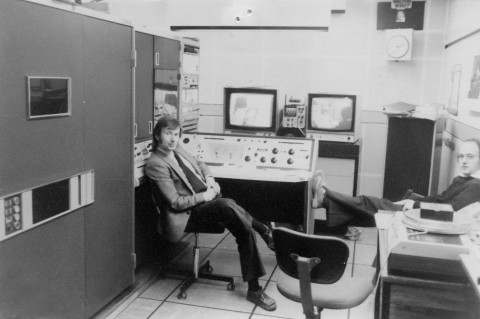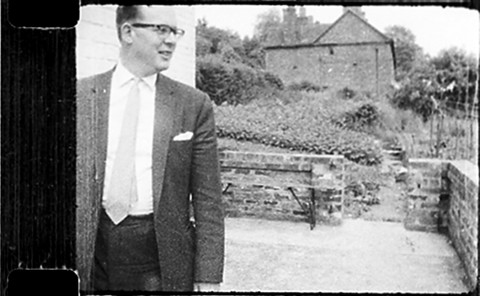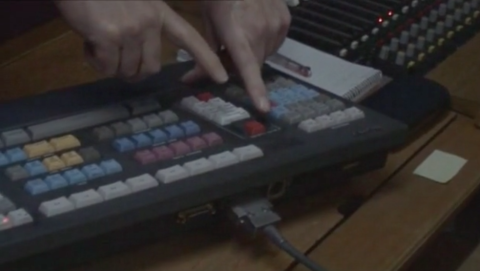
Tim Emblem-English with Jim Gregory. Copyright resides with the original holder, no reproduction without permission

Rank Cintel Mark 3, with Jim and Tim. Copyright resides with the original holder, no reproduction without permission
Last Friday I was part of the team reconstructing how telecine operated in the 1960-80s. The shoot was organised by the Royal Holloway, University of London, ADAPT project, which aims to reconstruct now defunct television production techniques, and record them for posterity. The idea was to reunite the hugely experienced telecine operator, Jim Gregory, with a Rank Cintel Mark 3 machine dating from the late 1980s: a machine he hadn’t used for many years. We also wanted Pebble Mill’s Jim Gregory, to discuss telecine practices with his Television Centre conterpart, Tim Emblem-English – who still operates the Mark 3 on a daily basis.
We had hoped to find a working example of the Rank Cintel Mark 2, but unfortunately one does not seem to still exist. The Mark 3 is at the BBC Post Production centre in Ruislip, and is involved in film restoration work for the BBC and external clients. It is linked up to a control desk, monitors and a bank of different format recorders. Unfortunately the Post Production centre at Ruislip is due to close down next year, and it is unclear yet what is going to happen to all the equipment, although it is likely to be sold off, so it was important to get the filming completed.
The Rank Cintel Mark 2 was more important certainly in the televisual history of Pebble Mill, than the Mark 3, and was used to play film inserts into live television shows, and studio dramas. Jim worked on the Mark 2 machines for many years, but only used the Mark 3 briefly in the 1990s.
Jim had brought an old can of film down with him: black and white footage from the mid 1960s. The film shows the newsroom at the BBC Broad Street studio, as well as behind the scenes in the Gosta Green drama studio, and even drinking in the Gosta Green Club! It also shows street shots around Birmingham. The footage provides a fascinating social history of the time. The joints kept breaking – but then the tape holding them together was 50 years old! Jim was able to grade the pictures through the desk without any trouble. When he was asked what it felt like to be reunited with the Mark 3, he replied that it just felt totally normal, like riding a bike, and that you had to rely on your muscle memory rather than thinking about what you were doing. Tim and Jim could have swapped stories of close shaves in telecine during live transmissions for many hours: of occasions when rolls of film rolled away across the floor, of the challenges of trying to fix a problem whilst having Pres shouting down the phone to you, and of grading shots live as they went out.
Although Jim no longer operates telecine machines, he is still employed as a regular freelance grader at the BBC Drama Village in Birmingham, working on a Da Vinci, or Avid Symphony, on shows like Father Brown.
Vanessa Jackson





